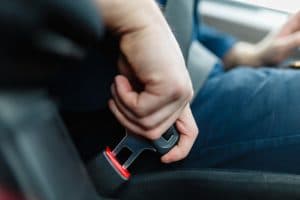Why Is it Important to Wear a Seat Belt?
 From our very first memories of riding in a car as a child, the notion of wearing a seatbelt was always actively enforced by parents, teachers, and authorities. As time continues and we all become of age to drive, we are still reminded of the importance of wearing a seatbelt, whether we are behind the wheel or as a passenger. Tragic news stories remind us every day of the type of consequences we could face if we choose not to wear a seatbelt.
From our very first memories of riding in a car as a child, the notion of wearing a seatbelt was always actively enforced by parents, teachers, and authorities. As time continues and we all become of age to drive, we are still reminded of the importance of wearing a seatbelt, whether we are behind the wheel or as a passenger. Tragic news stories remind us every day of the type of consequences we could face if we choose not to wear a seatbelt.
Unfortunately, there are many drivers who neglect to wear their seatbelt, which sadly results in the rise of fatal car accidents. Research shows that during the COVID-19 pandemic, while the number of drivers on the road decreased, there was in fact an increase in the number of traffic fatalities. A majority of these accidents involved a person, or persons being ejected from the vehicle. The Charlotte, NC car accident attorneys at Warren & Kallianos, PLLC explore the importance of seat belts in today’s blog.
2020 seatbelt fatalities across the country
In its May 2021 report “Early Estimates of Motor Vehicle Traffic Fatalities and Fatality Rate by Subcategories in 2020,” the National Highway Traffic Safety Administration (NHTSA) discovered that there was a 20% increase in car accident fatalities that ended in “occupant ejection.” In other words, these types of fatal accidents involved occupants being ejected from the vehicle, typically due to the absence of wearing a seatbelt. According to the NHTSA’s findings:
- Fatally injured vehicle occupants (excluding motorcycles) who were ejected, as a proportion of all fatalities, increased in most months from March to December.
- The greatest increase occurred in June (27% versus 21%).
- Total estimated fatalities for vehicle occupants (excluding motorcycles) who were ejected increased by 20% from 2019 to 2020.
During this 2020 NHTSA study, the number of unrestrained occupants, or passengers who refused to wear a seatbelt while in a moving vehicle, rose to 15%. A determination was made based on the increase of fatal car accidents involving occupants being ejected from the vehicle to be cohesive with unrestrained occupants.
What are North Carolina’s seat belt laws?
According to North Carolina code G.S. 20-135.2A, all drivers, front seat, and rear passengers age 16 and older must wear a seat belt. Children under the age of 16 are governed by the North Carolina child passenger safety law.
The law explains that the full restraint provided in the vehicle must be worn in its entirety and properly when the vehicle is in motion. It is illegal to place the shoulder belt behind the back.
The child passenger safety law of North Carolina requires all children 16 and younger be properly restrained in a restraint that is adequate for their individual age, weight, and height. A car seat or booster seat is required for children aged eight and younger or less than 80 pounds.
The penalties for violating the child passenger safety law in North Carolina are as follows:
- Driver is responsible for all children under 16 years old
- Penalty not to exceed $25
- Full court costs and fees apply to failure to secure a child in an appropriate CRS or seat belt violations
- Two (2) driver license points
- No insurance points
- No conviction if the child is less than 8 years old and proof is presented at trial that an appropriate CRD/Booster seat has been acquired for a vehicle in which the child is normally transported since the violation
North Carolina car accident fatalities rose in 2020
Despite the worldwide pandemic impacting the number of vehicles on the roads in 2020, traffic fatalities increased in North Carolina. In 2020, traffic fatalities surpassed 1,500 in the state for the first time in 13 years.
The data shows that the number of fatal crashes increased by eight percent in 2020 from 2019, while the number of miles driven decreased by 19% in 2020 from 2019. North Carolina motorists drove roughly 99 billion miles in 2020, compared to 123 billion in 2019.
“People are not doing things they normally do behind the wheel,” Mark Ezzell, the director of the N.C. Governor’s Highway Safety Program, said in a statement. “They may simply be forgetting to do that because their minds are elsewhere…. Congestion is an annoying thing, but one positive thing about it is it slows people down.”
Ezzell noted that speeding was the factor in one-quarter of the fatal accidents in 2020. He also pointed out that drivers are more distracted than ever right now because they are focusing more on their health than the task of driving when behind the wheel.
“With COVID, there’s been a sense of emotional distraction. People are concentrating on their health and their financial futures. And they’re not concentrating on the task of driving. So that’s a concern.”
Seat belt safety for all drivers and passengers
Seat belts have a reliable history of protecting passengers from ejection out of the vehicle and preventing traumatic injuries which can result from hitting the windshield. Seat belts also are known to decrease whiplash and hitting other areas in the car like the steering wheel or doors. Speeding while unrestrained also greatly increases your chances of harmful injuries. The importance of seat belts is evident for safety because the odds of experiencing severe injuries in an accident decreases immensely.
Did you suffer an injury in a car accident that wasn’t your fault? Whether you were wearing your seatbelt or not, the other driver should be held responsible for their negligent actions. The experienced Charlotte, N.C. car accident attorneys at Warren & Kallianos, PLLC can investigate the crash and help hold the responsible parties accountable. Call our office at 704-377-7777, or complete the contact form on our website to schedule a consultation with a member of our team.

At Warren & Kallianos, we believe in the importance of working directly with our attorneys, Jeff Warren and Chris Kallianos. When you work with our firm, Jeff and Chris are always accessible to you throughout the progress of your case.
Read more about Warren & Kallianos, PLLC
